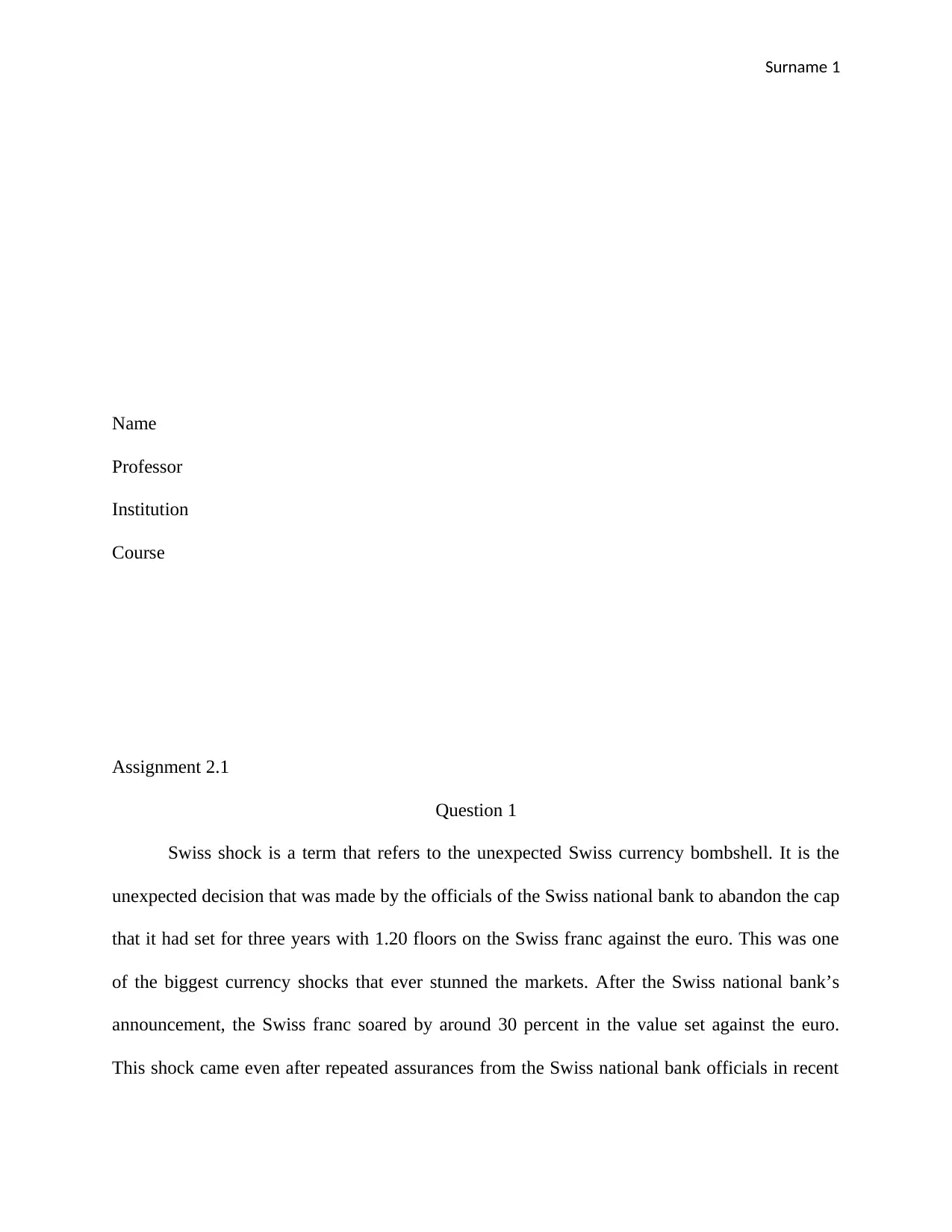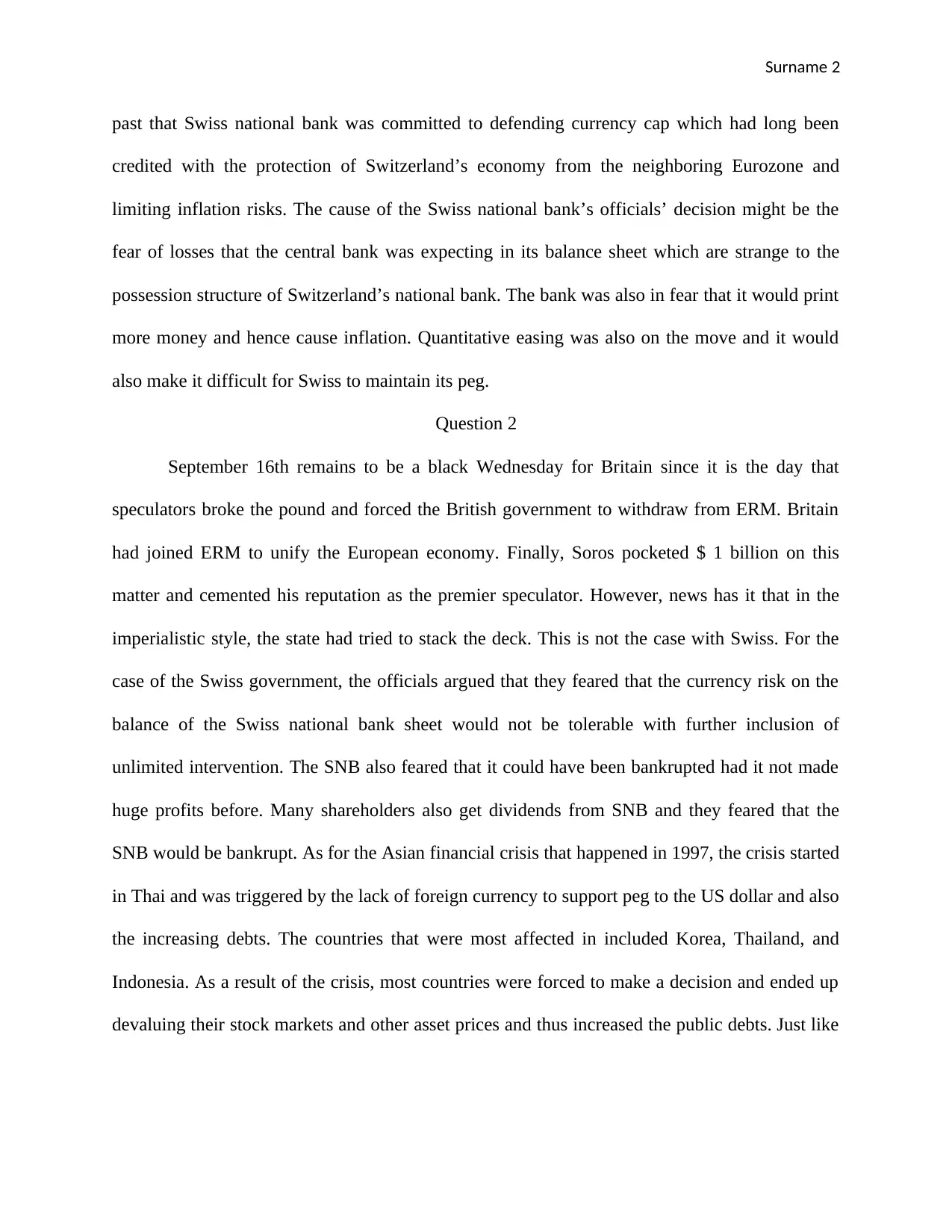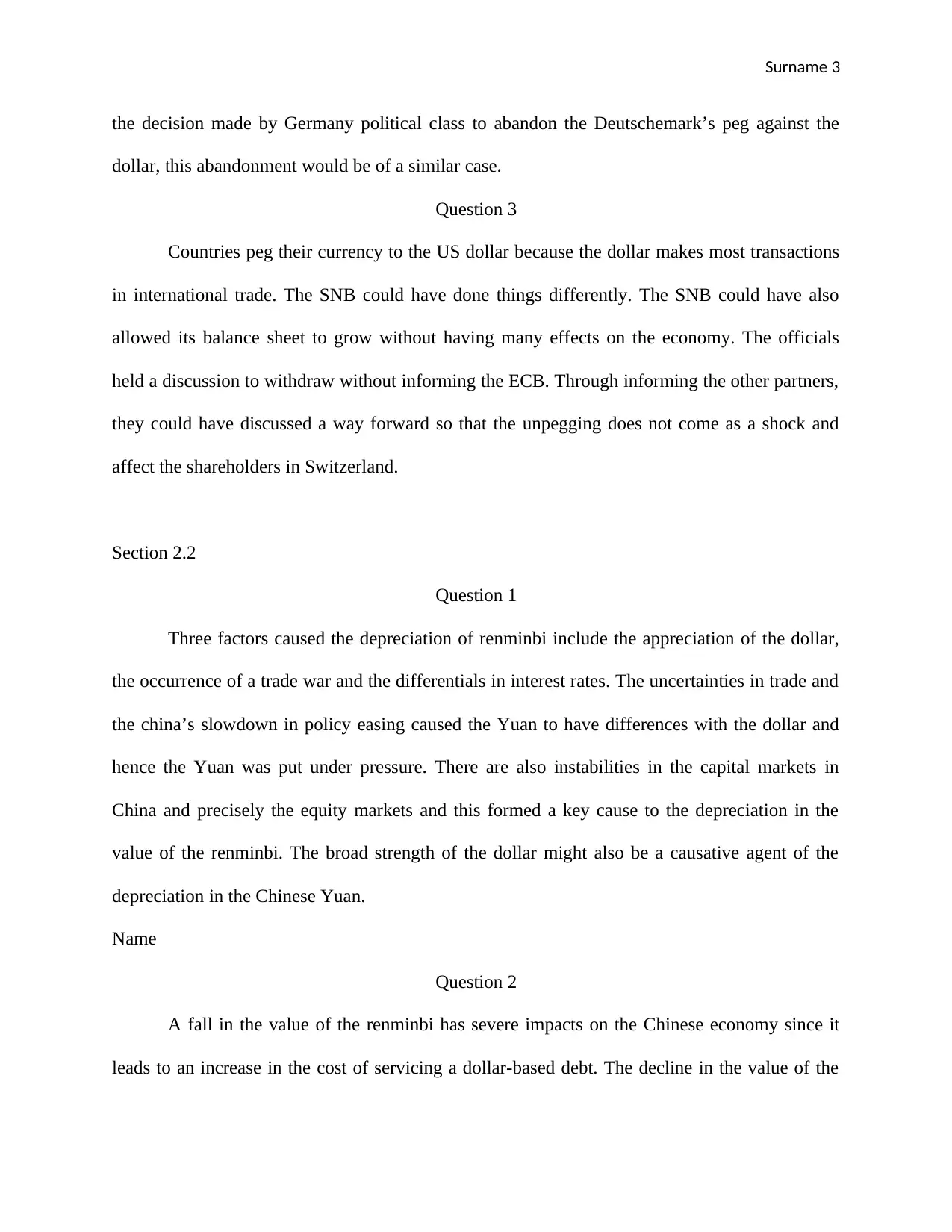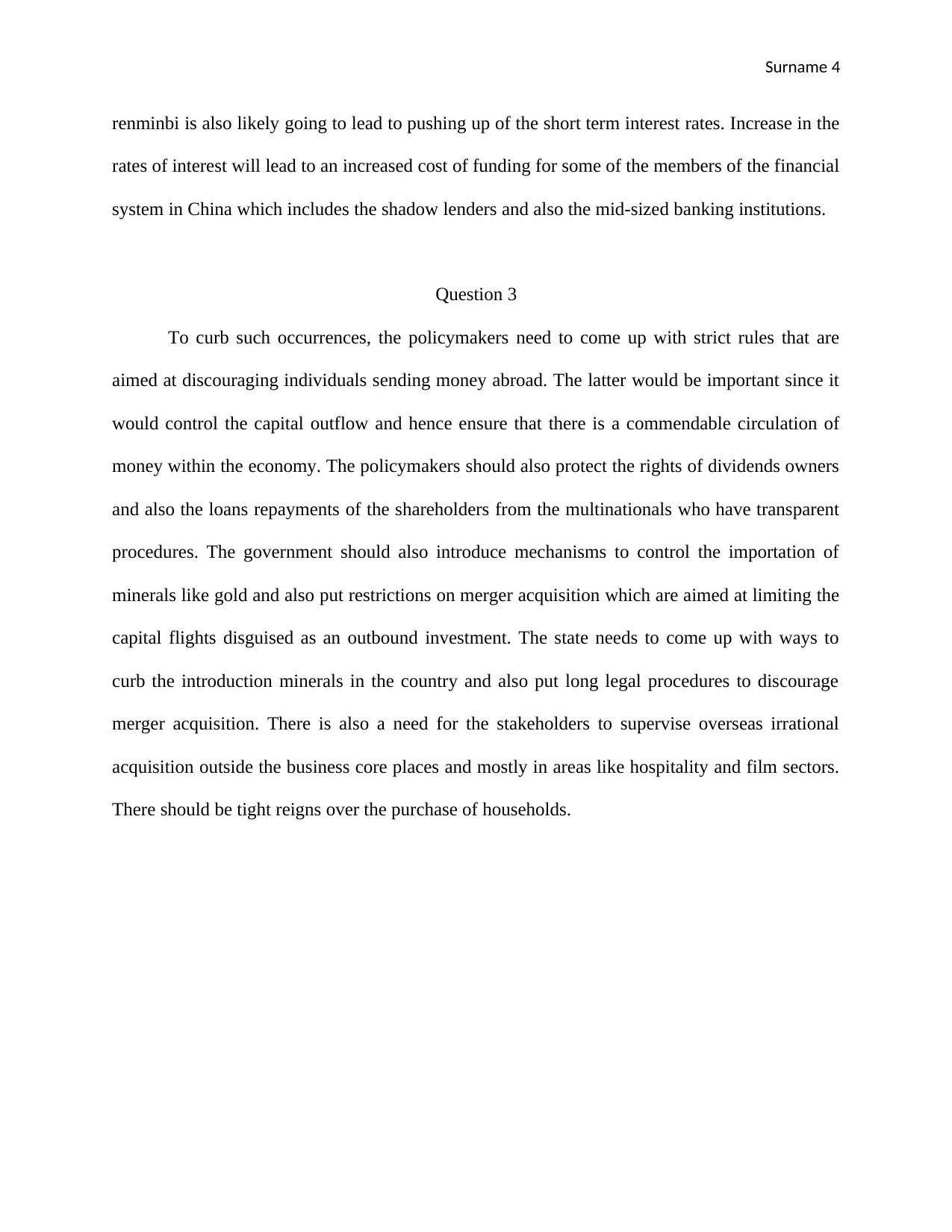University of Adelaide: Swiss Shock & Renminbi in Financial Markets
VerifiedAdded on 2023/04/04
|4
|923
|284
Homework Assignment
AI Summary
This assignment solution delves into the Swiss shock, an unexpected event triggered by the Swiss National Bank's decision to abandon its currency cap, and analyzes its causes and differences from historical speculative attacks. It further assesses the SNB's decision-making and explores alternative approaches. The solution also examines the depreciation of the renminbi, identifying factors such as the appreciation of the dollar, trade war implications, and interest rate differentials. It discusses the economic impacts of a falling renminbi and proposes policy measures to curb such occurrences, including stricter rules on capital outflow and protection of shareholder rights. This document is available on Desklib, a platform offering a wide range of study tools and resources for students.

Surname 1
Name
Professor
Institution
Course
Assignment 2.1
Question 1
Swiss shock is a term that refers to the unexpected Swiss currency bombshell. It is the
unexpected decision that was made by the officials of the Swiss national bank to abandon the cap
that it had set for three years with 1.20 floors on the Swiss franc against the euro. This was one
of the biggest currency shocks that ever stunned the markets. After the Swiss national bank’s
announcement, the Swiss franc soared by around 30 percent in the value set against the euro.
This shock came even after repeated assurances from the Swiss national bank officials in recent
Name
Professor
Institution
Course
Assignment 2.1
Question 1
Swiss shock is a term that refers to the unexpected Swiss currency bombshell. It is the
unexpected decision that was made by the officials of the Swiss national bank to abandon the cap
that it had set for three years with 1.20 floors on the Swiss franc against the euro. This was one
of the biggest currency shocks that ever stunned the markets. After the Swiss national bank’s
announcement, the Swiss franc soared by around 30 percent in the value set against the euro.
This shock came even after repeated assurances from the Swiss national bank officials in recent
Paraphrase This Document
Need a fresh take? Get an instant paraphrase of this document with our AI Paraphraser

Surname 2
past that Swiss national bank was committed to defending currency cap which had long been
credited with the protection of Switzerland’s economy from the neighboring Eurozone and
limiting inflation risks. The cause of the Swiss national bank’s officials’ decision might be the
fear of losses that the central bank was expecting in its balance sheet which are strange to the
possession structure of Switzerland’s national bank. The bank was also in fear that it would print
more money and hence cause inflation. Quantitative easing was also on the move and it would
also make it difficult for Swiss to maintain its peg.
Question 2
September 16th remains to be a black Wednesday for Britain since it is the day that
speculators broke the pound and forced the British government to withdraw from ERM. Britain
had joined ERM to unify the European economy. Finally, Soros pocketed $ 1 billion on this
matter and cemented his reputation as the premier speculator. However, news has it that in the
imperialistic style, the state had tried to stack the deck. This is not the case with Swiss. For the
case of the Swiss government, the officials argued that they feared that the currency risk on the
balance of the Swiss national bank sheet would not be tolerable with further inclusion of
unlimited intervention. The SNB also feared that it could have been bankrupted had it not made
huge profits before. Many shareholders also get dividends from SNB and they feared that the
SNB would be bankrupt. As for the Asian financial crisis that happened in 1997, the crisis started
in Thai and was triggered by the lack of foreign currency to support peg to the US dollar and also
the increasing debts. The countries that were most affected in included Korea, Thailand, and
Indonesia. As a result of the crisis, most countries were forced to make a decision and ended up
devaluing their stock markets and other asset prices and thus increased the public debts. Just like
past that Swiss national bank was committed to defending currency cap which had long been
credited with the protection of Switzerland’s economy from the neighboring Eurozone and
limiting inflation risks. The cause of the Swiss national bank’s officials’ decision might be the
fear of losses that the central bank was expecting in its balance sheet which are strange to the
possession structure of Switzerland’s national bank. The bank was also in fear that it would print
more money and hence cause inflation. Quantitative easing was also on the move and it would
also make it difficult for Swiss to maintain its peg.
Question 2
September 16th remains to be a black Wednesday for Britain since it is the day that
speculators broke the pound and forced the British government to withdraw from ERM. Britain
had joined ERM to unify the European economy. Finally, Soros pocketed $ 1 billion on this
matter and cemented his reputation as the premier speculator. However, news has it that in the
imperialistic style, the state had tried to stack the deck. This is not the case with Swiss. For the
case of the Swiss government, the officials argued that they feared that the currency risk on the
balance of the Swiss national bank sheet would not be tolerable with further inclusion of
unlimited intervention. The SNB also feared that it could have been bankrupted had it not made
huge profits before. Many shareholders also get dividends from SNB and they feared that the
SNB would be bankrupt. As for the Asian financial crisis that happened in 1997, the crisis started
in Thai and was triggered by the lack of foreign currency to support peg to the US dollar and also
the increasing debts. The countries that were most affected in included Korea, Thailand, and
Indonesia. As a result of the crisis, most countries were forced to make a decision and ended up
devaluing their stock markets and other asset prices and thus increased the public debts. Just like

Surname 3
the decision made by Germany political class to abandon the Deutschemark’s peg against the
dollar, this abandonment would be of a similar case.
Question 3
Countries peg their currency to the US dollar because the dollar makes most transactions
in international trade. The SNB could have done things differently. The SNB could have also
allowed its balance sheet to grow without having many effects on the economy. The officials
held a discussion to withdraw without informing the ECB. Through informing the other partners,
they could have discussed a way forward so that the unpegging does not come as a shock and
affect the shareholders in Switzerland.
Section 2.2
Question 1
Three factors caused the depreciation of renminbi include the appreciation of the dollar,
the occurrence of a trade war and the differentials in interest rates. The uncertainties in trade and
the china’s slowdown in policy easing caused the Yuan to have differences with the dollar and
hence the Yuan was put under pressure. There are also instabilities in the capital markets in
China and precisely the equity markets and this formed a key cause to the depreciation in the
value of the renminbi. The broad strength of the dollar might also be a causative agent of the
depreciation in the Chinese Yuan.
Name
Question 2
A fall in the value of the renminbi has severe impacts on the Chinese economy since it
leads to an increase in the cost of servicing a dollar-based debt. The decline in the value of the
the decision made by Germany political class to abandon the Deutschemark’s peg against the
dollar, this abandonment would be of a similar case.
Question 3
Countries peg their currency to the US dollar because the dollar makes most transactions
in international trade. The SNB could have done things differently. The SNB could have also
allowed its balance sheet to grow without having many effects on the economy. The officials
held a discussion to withdraw without informing the ECB. Through informing the other partners,
they could have discussed a way forward so that the unpegging does not come as a shock and
affect the shareholders in Switzerland.
Section 2.2
Question 1
Three factors caused the depreciation of renminbi include the appreciation of the dollar,
the occurrence of a trade war and the differentials in interest rates. The uncertainties in trade and
the china’s slowdown in policy easing caused the Yuan to have differences with the dollar and
hence the Yuan was put under pressure. There are also instabilities in the capital markets in
China and precisely the equity markets and this formed a key cause to the depreciation in the
value of the renminbi. The broad strength of the dollar might also be a causative agent of the
depreciation in the Chinese Yuan.
Name
Question 2
A fall in the value of the renminbi has severe impacts on the Chinese economy since it
leads to an increase in the cost of servicing a dollar-based debt. The decline in the value of the
⊘ This is a preview!⊘
Do you want full access?
Subscribe today to unlock all pages.

Trusted by 1+ million students worldwide

Surname 4
renminbi is also likely going to lead to pushing up of the short term interest rates. Increase in the
rates of interest will lead to an increased cost of funding for some of the members of the financial
system in China which includes the shadow lenders and also the mid-sized banking institutions.
Question 3
To curb such occurrences, the policymakers need to come up with strict rules that are
aimed at discouraging individuals sending money abroad. The latter would be important since it
would control the capital outflow and hence ensure that there is a commendable circulation of
money within the economy. The policymakers should also protect the rights of dividends owners
and also the loans repayments of the shareholders from the multinationals who have transparent
procedures. The government should also introduce mechanisms to control the importation of
minerals like gold and also put restrictions on merger acquisition which are aimed at limiting the
capital flights disguised as an outbound investment. The state needs to come up with ways to
curb the introduction minerals in the country and also put long legal procedures to discourage
merger acquisition. There is also a need for the stakeholders to supervise overseas irrational
acquisition outside the business core places and mostly in areas like hospitality and film sectors.
There should be tight reigns over the purchase of households.
renminbi is also likely going to lead to pushing up of the short term interest rates. Increase in the
rates of interest will lead to an increased cost of funding for some of the members of the financial
system in China which includes the shadow lenders and also the mid-sized banking institutions.
Question 3
To curb such occurrences, the policymakers need to come up with strict rules that are
aimed at discouraging individuals sending money abroad. The latter would be important since it
would control the capital outflow and hence ensure that there is a commendable circulation of
money within the economy. The policymakers should also protect the rights of dividends owners
and also the loans repayments of the shareholders from the multinationals who have transparent
procedures. The government should also introduce mechanisms to control the importation of
minerals like gold and also put restrictions on merger acquisition which are aimed at limiting the
capital flights disguised as an outbound investment. The state needs to come up with ways to
curb the introduction minerals in the country and also put long legal procedures to discourage
merger acquisition. There is also a need for the stakeholders to supervise overseas irrational
acquisition outside the business core places and mostly in areas like hospitality and film sectors.
There should be tight reigns over the purchase of households.
1 out of 4
Your All-in-One AI-Powered Toolkit for Academic Success.
+13062052269
info@desklib.com
Available 24*7 on WhatsApp / Email
![[object Object]](/_next/static/media/star-bottom.7253800d.svg)
Unlock your academic potential
Copyright © 2020–2025 A2Z Services. All Rights Reserved. Developed and managed by ZUCOL.


